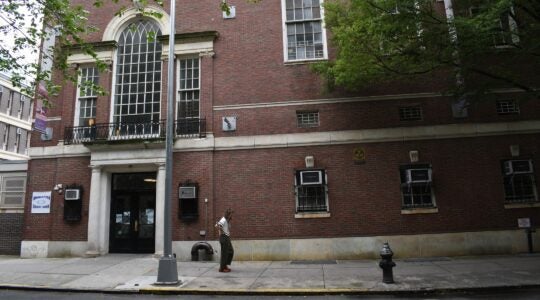Of all American comedians, none is more instantly recognizable than Groucho Marx. With his rolling eyes, greasepaint mustache, waggling cigar and stooped posture, Groucho remains part of our national consciousness more than three decades after his death. In his acclaimed traveling show, “An Evening With Groucho,” which comes to Queens this weekend, Frank Ferrante channels the great comedian. Accompanied by an on-stage pianist, Ferrante recreates Groucho’s routines, ad-libs with the audience, and warbles some of Groucho’s best-known songs, including “Hooray for Captain Spaulding” and “Lydia, the Tattooed Lady.”
Ferrante grew up in Sierra Madre, Calif., in the late 1960s and early 1970s. His only Jewish friend introduced him to the Marx Brothers film “A Day at the Races,” and the 9-year-old Ferrante was hooked. While majoring in theater at the University of Southern California, Ferrante learned that Elaine Stritch’s late husband, John Bay, had done a one-man show about Groucho. The young actor begged Stritch for the rights to perform the script, and she agreed. Groucho’s children, Arthur and Miriam, came to see the show at USC, as did Morrie Ryskind (the co-writer of many of the Marx Brothers films).
Before long, Ferrante was performing in Arthur Marx’s play, “Groucho: A Life in Revue,” first at a dinner theater in Kansas City and then, in 1986, at the Lucille Lortel in New York; the Off-Broadway production ran for almost a year, then transferred to London for six months, and finally, in 2001, was taped by PBS. Ever since, Ferrante has toured the country for a few months a year as Groucho.
During the Vietnam era, Ferrante told The Jewish Week, the Marx Brothers films were constantly on the air. “My friends and I all wanted to be Groucho. His brashness and irreverence struck a chord with us. He embodied our disillusionment, anger and frustration.” Groucho’s humor, Ferrante said, is “Jewish immigrant outsider humor, filled with lack of trust and borderline disdain.”
Groucho, who never made it past the sixth grade, was “self-taught and extremely sensitive,” Ferrante said. “He was thin-skinned and easily hurt.” Little wonder, Ferrante recalled, that upon being told that his son could not go into the pool at a gentile-only beach club on Long Island, Groucho asked if the boy, being “half-Jewish,” could go in up to his knees. “Groucho’s whole humor,” Ferrante said, “was a response to his Judaism.”
Stephen Whitfield, who teaches American studies at Brandeis, noted that Woody Allen called Groucho the only performer who “was funny in every way — he looked funny, walked funny and talked funny.” And, Whitfield reflected, “it’s hard to imagine another comedian doing that.”
“An Evening with Groucho” runs at Queens Theatre in the Park, 14 United Nations South, Flushing Meadows Corona Park. Performances are Friday at 2, Saturday at 2 and 8, and Sunday at 3. For tickets, $25-$49, call (718) 760-0064 or visit www.queens theatre.org/evening-groucho.
The New York Jewish Week brings you the stories behind the headlines, keeping you connected to Jewish life in New York. Help sustain the reporting you trust by donating today.




